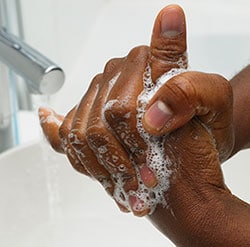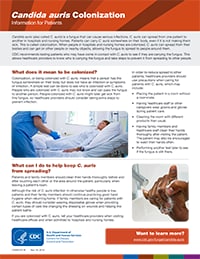Candida auris Colonization
Information for Patients
Candida auris (also called C. auris) is a fungus that can cause serious infections. C. auris can spread from one patient to another in hospitals and nursing homes. Patients can carry C. auris somewhere on their body, even if it is not making them sick. This is called colonization. When people in hospitals and nursing homes are colonized, C. auris can spread from their bodies and can get on other people or nearby objects, allowing the fungus to spread to people around them.
CDC recommends testing patients who may have come in contact with C. auris to see if they are carrying the fungus. This allows healthcare providers to know who is carrying the fungus and take steps to prevent it from spreading to other people.
What does it mean to be colonized?
To reduce spread to other patients, healthcare personnel should use precautions when caring for patients with C. auris, which may include:
- Placing the patient in a different room.
- Having healthcare personnel or other caregivers wear gowns and gloves during patient care.
- Cleaning the room with different products than usual.
- Having family members and healthcare personnel clean their hands thoroughly after visiting the patient. The patient may also be encouraged to wash their hands often.
Colonization, or being colonized with C. auris, means that a person has the fungus somewhere on their body but does not have an infection or symptoms of infection. A simple test can be done to see who is colonized with C. auris. People who are colonized with C. auris may not know and can pass the fungus to another person. People colonized with C. auris might later get sick from this fungus, so healthcare providers should consider taking extra steps to prevent infection.

What can I do to help keep C. auris from spreading?

Patients and family members should clean their hands thoroughly before and after touching each other or the area around the patient, particularly when leaving a patient’s room.
Although the risk of C. auris infection in otherwise healthy people is low, patients and their family members should continue practicing good hand hygiene when returning home. If family members are caring for patients with C. auris, they should consider wearing disposable gloves when providing certain types of care like changing the dressing on wounds and helping the patient bathe.
If you are colonized with C. auris, tell your healthcare providers when visiting healthcare offices and when admitted to hospitals and nursing homes.
